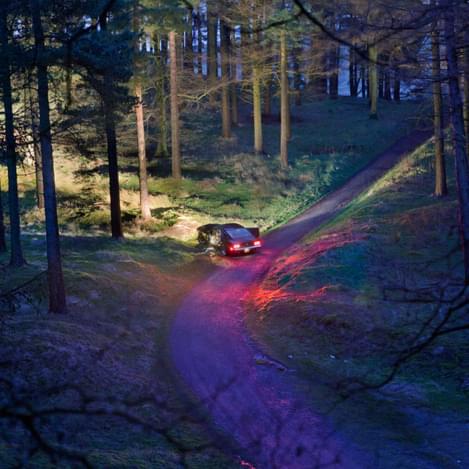Drenge make a bloodied mess of the idea 'second album syndrome'
"Undertow"

In their three piece form, they are as possessed as ever, and Undertow retains all their hangdog spirit. Pleasingly, they’ve kept it local; working with Ross Orton in the Sheffield studio that produced AM, two albums by Jarvis Cocker and one by M.I.A. has worked wonders. It’s far from polished, but the instrumentation is thicker, and the addition of the bass makes it sound almost orchestral after that scrappy one-two of guitar and drums.
"Introduction" sets the tone, eddies of feedback mix with reverb and plucked guitar, giving way to "Running Wild" and its cavernous, strutting riffs. The vocal is rubbed smooth, here and on "Never Awake"; Eoin croons balefully over death-rattle drums and a thick layer of fuzz. It’s a deftness of touch that gives an entirely new dimension to their sound, lush yet sinister; echoing and expansive.They still have the knack of turning pop hooks into punk riffs however; lead single "We Can Do What We Want" channels The Stooges in a frenzied romp, and they barely pause for breath before gleefully battering their instruments on "Favourite Son": Eoin spits verbs behind rasping guitar and Rory’s powerhouse drums. That knack for groove shines throughout; on highlight "The Woods" in particular, which sounds like playing Tango in the Night at a séance. Its near poppiness sums up their transformation and they pull it off with aplomb; integrating a muscular, straightforward solo and singalong harmonies, whilst remaining recognisably Drenge.
The underdog, scattergun rock and roll on their debut was visceral, but on Undertow, exuberance has been replaced with clarity of purpose and an almost grim determination. This newfound confidence, and the range of sound that comes with it, has enabled them to do more with their music, creating a mood and conjuring with definite themes. Transgression (see "We Can Do What We Want" and "Running Wild") and (an often ambiguous) sexuality packaged with characteristic bloodlust (see "Favourite Son", "The Snake" and "Side by Side") are their touchstones, all intertwined with dense forests of fuzz. It’s a disquieting picture, and I find myself drawn to the album artwork, that abandoned car, the dark forest. There is often nothing directly disturbing in either the art or the music, but it’s an indirect, psychological violence that comes in what isn’t said. The music on Undertow describes the grim happenings beyond its cover.
And it’s testament that they paint pictures now. It comes to a head in "Standing in the Cold", with the lyrics "you wanted my heart, for its little work / I was half your age, and I thought we were in love / then I found your car, it was already burnt / your eyes stung like stained glass windows / but you had my soul". It’s every inch the grisly end to the story they have painted, with sure footed progression, and unflinching talent. Their second album continues the work of the first, a yardstick for the heavy guitar sound, and is in its own way as hard hitting, visceral and effortlessly brilliant. An endorsement ringing like my ears.
Get the Best Fit take on the week in music direct to your inbox every Friday

Bon Iver
SABLE, fABLE

Mamalarky
Hex Key

Florist
Jellywish





